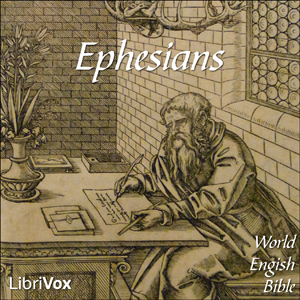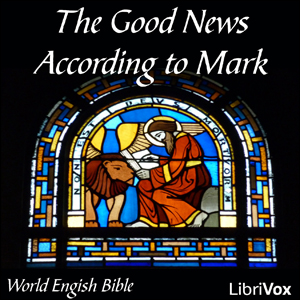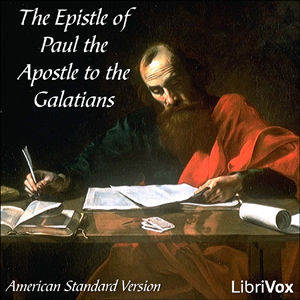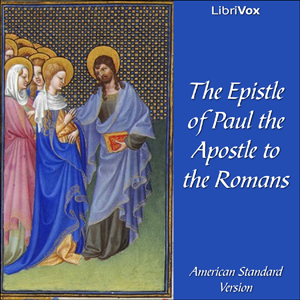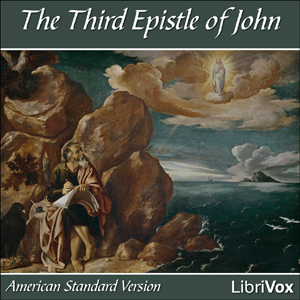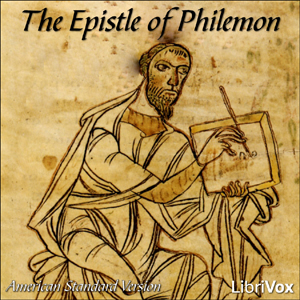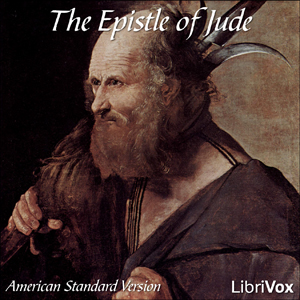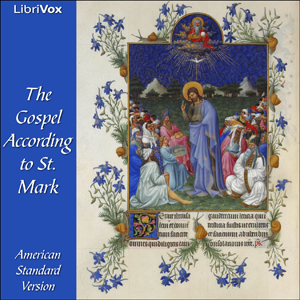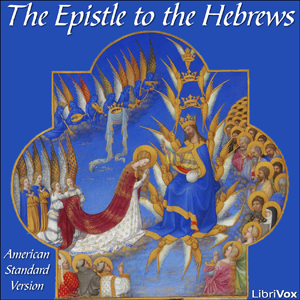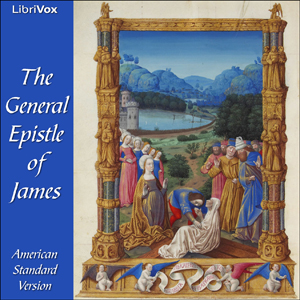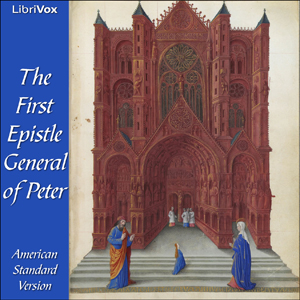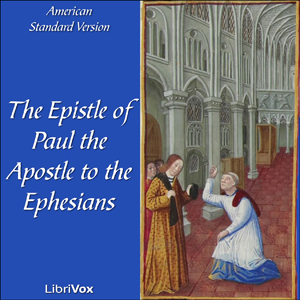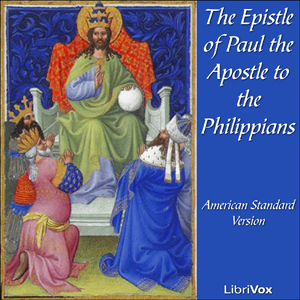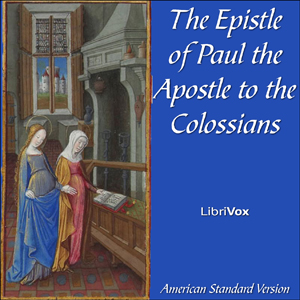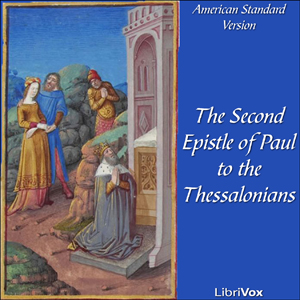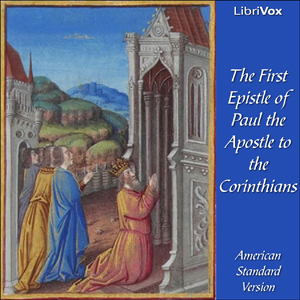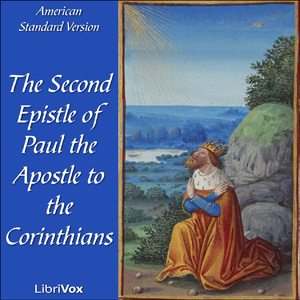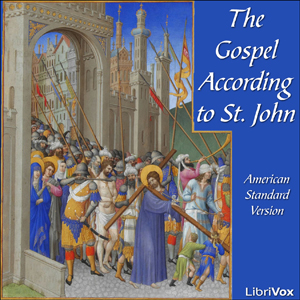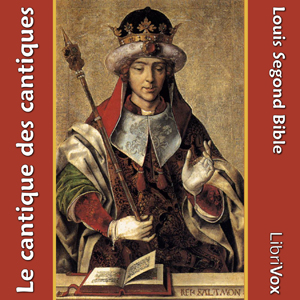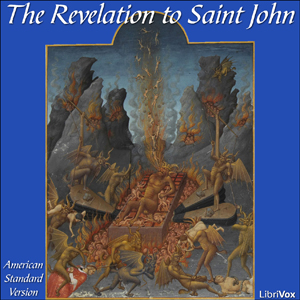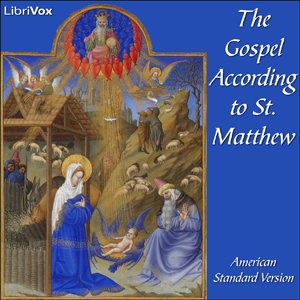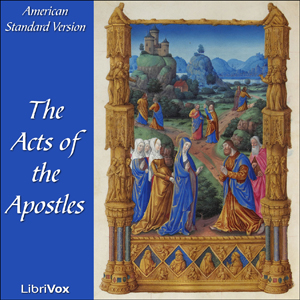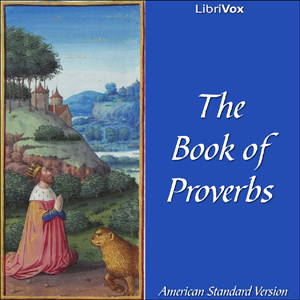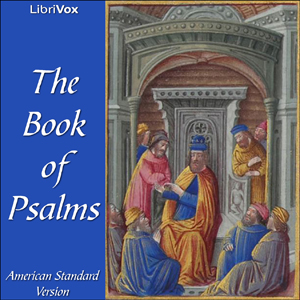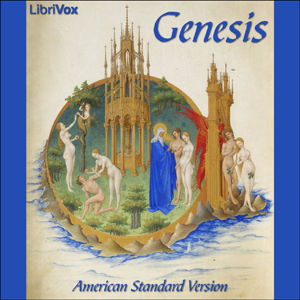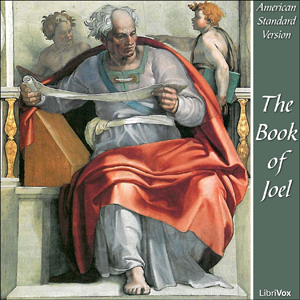Ce quarante-troisième livre de la Bible, traduite par Louis Segond, au XIXe siècle et publiée au début du siècle suivant, nous est parvenu comme étant le témoignage du disciple que Jésus aimait.
L'auteur a écrit ces choses « afin que vous croyiez que Jésus est le Christ, le Fils de Dieu, et qu'en croyant vous ayez la vie en son nom ».(Summary by Ezwa)
5 episodes
To celebrate Easter, LibriVox volunteers bring you nine different recordings of various psalms from the World English Bible. This was the weekly poetry project for the week of April 9th, 2006.(Summary by Annie Coleman)This collection includes:
Psalm 5
Psalm 23
Psalm 27
Psalm 88
Psalm 96
Psalm 98
Psalm 123
Psalm 131
9 episodes
The book of John stands out among the Biblical writings about Jesus as an eloquent depiction of his deity, composed in detailed and elegant prose. It's believed to have been written by the apostle John near the end of the first century A.D.
The World English Bible is a new public-domain translation, retaining the accuracy and beauty of previous translations as well as of the original languages, while achieving a remarkable level of accessibility to modern readers. Summary by Rachelellen
21 episodes
The Gospel of Matthew (literally, "according to Matthew"; Greek, Κατά Μαθθαίον or Κατά Ματθαίον) is one of the four Gospel accounts of the New Testament. It narrates an account of the life and ministry of Jesus, from his genealogy to his post-resurrection commissioning of his Apostles to "go and make disciples of all nations." Bibles traditionally print Matthew as the first gospel, followed in order by Mark, Luke and John. Authorship is traditionally ascribed to Matthew the Evangelist. (Summary from Wikipedia).
14 episodes
This short narrative book of the Old Testament contains one of the most famous Bible Stories, of “Jonah and the Whale.” The “great fish” however is only mentioned in three verses, and the true punch comes in the oft-neglected fourth chapter. “Is it right” for a person like Jonah to be vexed by God’s mercy on others?(Summary by Laura Fox)
1 episodes
The Epistle to Galatians is a book of the New Testament. It is a letter from Paul of Tarsus to a number of early Christian communities in the Roman province of Galatia in central Anatolia. It is principally concerned with the controversy surrounding Gentile Christians and the Mosaic Law within Early Christianity. Along with the Epistle to the Romans, it is the most theologically significant of the Pauline epistles, and has been particularly influential in Protestant thought.
1 episodes
Ces soixantième et soixante et unième livres de la Bible, traduite par Louis Segond, au XIXe siècle et publiée au début du siècle suivant sont adressées par Pierre, apôtre de Jésus-Christ, « à ceux qui sont étrangers et dispersés » dans cinq régions de l'Asie mineure et « à ceux qui ont reçu en partage une foi du même prix que la nôtre ».
Dans ces deux lettres, Pierre cherche « à éveiller par des avertissements votre saine intelligence, afin que vous vous souveniez des choses annoncées par les prophètes, et du commandement du Seigneur et Sauveur ». (Résumé par Ezwa)
2 episodes
While in prison, Paul writes this letter to another Christian, Philemon. Paul has met with and converted a man named Onesimus, probably a runaway slave, and he writes to Philemon, Onesimus's legal owner, to tell him that he is sending him back. Appealing to Philemon's personal debt to him, Paul urges him to welcome Onesimus as though he were Paul himself, and to accept him as a fellow brother in Christ.
(Summary by Leon Mire)
1 episodes
Paul writes to the church at Ephesus, beginning with a praise to God for the forgiveness of their sins and for choosing them in His grace. Paul prays for the spiritual well-being of the Ephesians and reminds them how sinful they were before they turned to Christ. He then speaks of his revelation, by which he was selected to preach to the Gentiles, for they can also be saved. Among other things, he urges the Ephesians to be humble, to avoid sexual immorality and foul speech, and to be united in Christ even though they are diverse in spiritual talents. He also gives advice to husbands and wives, children and fathers, and servants and masters. The letter concludes with an extended metaphor of the Christian as spiritual warrior. (Summary by Leon Mire)
1 episodes
Mark's Gospel is certainly the shortest, and possibly the earliest of the four canonical gospels. It covers Jesus' life from his Baptism to his Resurrection, but concentrates particularly on the week leading up to the Crucifixon. It appears to have been written for a general audience, and its relative simplicity makes it perhaps the most accessible of the four Gospels for a first time reader. (Paragraph by Justin)
8 episodes
The Epistle to the Galatians is a book of the New Testament. It is a letter from Paul of Tarsus to a number of early Christian communities in the Roman province of Galatia in central Anatolia. It is principally concerned with the controversy surrounding Gentile Christians and the Mosaic Law within Early Christianity. Along with the Epistle to the Romans, it is the most theologically significant of the Pauline epistles, and has been particularly influential in Protestant thought.
(Summary from Wikipedia)
6 episodes
The Epistle to the Romans is one of the letters of the New Testament canon of the Christian Bible. In the words of N.T. Wright, the Book of Romans is "neither a systematic theology nor a summary of Paul's lifework, but it is by common consent his masterpiece. It dwarfs most of his other writings, an Alpine peak towering over hills and villages. Not all onlookers have viewed it in the same light or from the same angle, and their snapshots and paintings of it are sometimes remarkably unalike. Not all climbers have taken the same route up its sheer sides, and there is frequent disagreement on the best approach. What nobody doubts is that we are here dealing with a work of massive substance, presenting a formidable intellectual challenge while offering a breathtaking theological and spiritual vision."
(Summary from Wikipedia).
16 episodes
The First Epistle of John is a book of the Bible New Testament, the fourth of the catholic or "general" epistles. It was written in Ephesus about 90-110 AD, apparently by the same author or authors who wrote the Gospel of John and the other two epistles of John. Not actually a letter, it is a sermon written to counter the heresy that Jesus did not come "in the flesh" but only as a spirit. It also defines how Christians are to discern true teachers: by their ethics, their proclamation of Jesus in the flesh, and by their love. (Summary from Wikipedia)
5 episodes
The Second Epistle of John (normally just called 2nd John or 2 John) is a book of the Bible New Testament. It is the 63rd book of the Bible, and the shortest, weighing in at a mere 13 verses. (Summary from Wikipedia)
1 episodes
The New Testament Third Epistle of John (often referred to as 3 John) is the 64th book of the Bible. Written in the form of an epistle, it is the second-shortest book of the Christian Bible by number of verses, and the shortest in regard to number of words (according to the KJV). (Wikipedia)
1 episodes
Paul, who is apparently in prison (probably in either Rome or Ephesus), writes to a fellow-Christian Philemon and two of his associates. Paul writes on behalf of Philemon's slave, Onesimus. Beyond that, it is not self-evident as to what has transpired. Onesimus is described as having been 'separated' from Philemon, once having been 'useless' to him (a pun on Onesimus' name, which means 'useful'), and having done him wrong. (Wikipedia)
1 episodes
The epistle is titled as written by "Jude, a servant of Jesus Christ and a brother of James" NIV. If taken literally this means that the author is a brother of Jesus, an attribution which is now increasingly considered as the most probable. (Wikipedia)
1 episodes
The Gospel of Mark is a Gospel of the New Testament. It narrates the life of Jesus from John the Baptist to the Ascension, but it concentrates particularly on the last week of his life (chapters 11-16, the trip to Jerusalem). Its swift narrative portrays Jesus as a heroic man of action, an exorcist, a healer and miracle worker. It calls him the Christ (equivalent to Messiah), the Son of Man, and a few times as the Son of God. (Summary from Wikipedia)
16 episodes
The Book of James : Supposed to have been written by James the Brother of Jesus and First Leader of the Christian movement in Jerusalem after the death of Jesus Christ. The theme of this book is the importance of Works as the vehicle of Faith . ( Written by Robert Scott )
1 episodes
The Epistle to the Hebrews (abbr. Heb for citations) is one of the books in the New Testament. Though traditionally credited to the Apostle Paul, the letter is anonymous and most modern scholars, both conservative and critical, believe its author was not Paul himself but some other member of his Pauline community. The letter has carried its traditional title since Tertullian described it as Barnabae titulus ad Hebraeos in De Pudicitia chapter 20 ("Barnabas's Letter to the Hebrews".) (Summary from Wikipedia)
13 episodes
The Epistle of James is a book in the Christian New Testament. The author identifies himself as James (James 1:1), traditionally understood as James the Just, the brother of Jesus, first of the Seventy Disciples and first Bishop of Jerusalem. With no overriding theme, the text condemns various sins and calls on Christians to be patient while awaiting the imminent Second Coming. The epistle has caused controversy: Protestant reformer Martin Luther argued that it was not the work of an apostle. Roman Catholicism, Eastern Orthodoxy and Mormonism claim it contradicts Luther's doctrine of justification through faith alone (Sola fide) derived from his translation of Romans 3:28. The Christian debate over Justification is still unsettled, see also Joint Declaration on the Doctrine of Justification and Christian view of the Law. (Summary from Wikipedia)
5 episodes
The First Epistle of Peter is a book of the New Testament. It has traditionally been held to have been written by Saint Peter the apostle during his time as bishop of Rome. The letter is addressed to various churches in Asia Minor suffering religious persecution. (Summary from Wikipedia)
5 episodes
The Second Epistle of Peter is a book of the New Testament of the Bible. According to the epistle itself, it was written by the apostle Peter, an eyewitness to Jesus' ministry. He criticizes "false teachers" who distort the authentic, apostolic tradition, and predicts judgement for them. He explains that God has delayed the Second Coming so that more people will have the chance to reject evil and find salvation. He calls on Christians to wait patiently for the parousia and to study scripture. (Summary from Wikipedia)
3 episodes
Described by William Barclay as the "Queen of the Epistles," the Epistle to the Ephesians is one of the books of the Bible in the New Testament. Paul is traditionally said to have written the letter while he was in prison in Rome (around 63 A.D.). This would be about the same time as the Epistle to the Colossians (which in many points it resembles) and the Epistle to Philemon. (Summary from Wikipedia)
6 episodes
The Epistle to Philippians (or just Philippians) is a book included in the New Testament of the Bible. It is a letter from St. Paul to the church of Philippi. (Summary from Wikipedia)
4 episodes
The Epistle to the Colossians is a book of the Bible New Testament. The book is a letter from Paul to the church in Colossae. (Summary from Wikipedia)
4 episodes
The Epistle to Titus is a book of the canonic New Testament, one of the three so-called "pastoral epistles" (with 1 Timothy and 2 Timothy). It is a letter from Paul to the Apostle Titus. (Summary from Wikipedia)
3 episodes
The First Epistle to Timothy is one of the three Pastoral Epistles, written by Saint Paul and part of the New Testament of the Bible. It consists mainly of counsels to Timothy regarding the forms of worship and organization of the Church, and the responsibilities resting on its several members, including episcopi (translated as "bishops") and diaconi ("deacons"); and secondly of exhortation to faithfulness in maintaining the truth amid surrounding errors, presented as a prophecy of erring teachers to come. (Summary from Wikipedia)
6 episodes
The Second Epistle to Timothy is one of the three Pastoral Epistles, written by Paul, and is part of the canonical New Testament. It may have been written sometime in 67 A.D. during Paul's second Roman imprisonment. In his letter, the writer urges Timothy to not have a "spirit of timidity" and to "not be ashamed to testify about our Lord" (1:7-8). The writer also entreats Timothy to come to him before winter, and to bring Mark with him (cf. Philippians 2:22). He was anticipating that "the time of his departure was at hand" (4:6), and he exhorts his "son Timothy" to all diligence and steadfastness in the face of false teachings, with advice about combatting them with reference to the teachings of the past, and to patience under persecution (1:6–15), and to a faithful discharge of all the duties of his office (4:1–5), with all the solemnity of one who was about to appear before the Judge of the quick and the dead. (Summary from Wikipedia)
4 episodes
The First Epistle to the Thessalonians, also known as the First Letter to the Thessalonians, is a book from the New Testament of the Christian Bible. It was written by Paul. (Summary from Wikipedia)
5 episodes
The Second Epistle to the Thessalonians, also known as the Second Letter to the Thessalonians, is a book from the New Testament of the Christian Bible. It was written by Paul. (Summary from Wikipedia)
3 episodes
The First Epistle to the Corinthians is a book of the Bible in the New Testament. 1 Corinthians is a letter from Paul of Tarsus and Sosthenes to the Christians of Corinth, Greece. This epistle contains some of the best-known phrases in the New Testament, including (depending on the translation) "without love, I am nothing" (13:1) and "when I was a child, I spoke as a child, I felt as a child, I thought as a child" (13:11). Paul turns the hearts of Christians from selfish factionalism to selfless service of others in love. (Summary from Wikipedia)
16 episodes
The Second Epistle to the Corinthians is a book in the New Testament, written by Paul the Apostle. In this book, sometimes called Paul's Stormy Weather Epistle, Paul is at his most personal in dealing with the brethren at Corinth. Paul encourages the Christians to examine themselves (2 Cor. 13:5) to test whether they are to be found in Christ as a father helps his children to mature to become the image of Christ himself. (Summary from Wikipedia adapted by Sam Stinson)
13 episodes
The Gospel of John, (literally, According to John; Greek, Κατά Ιωαννην, Kata Iōannēn) is the fourth gospel in the canon of the New Testament, traditionally ascribed to John the Evangelist. Like the three synoptic gospels, it contains an account of some of the actions and sayings of Jesus, but differs from them in ethos and theological emphases. The purpose is expressed in the conclusion, 20:30-31: "...these [Miracles of Jesus] are written that you may (come to) believe that Jesus is the Messiah, the Son of God, and that through this belief you may have life in his name. The book hinges on the seven signs Jesus performed and ends with the Passion of the Lord.
(Summary from Wikipedia adapted by Sam Stinson).
21 episodes
Ce vingt-deuxième livre de la Bible, traduite par Louis Segond, au XIXe siècle et publiée au début du siècle suivant se compose d'un dialogue entre la plus belle des femmes et son bien-aimé. «Mets-moi comme un sceau sur ton coeur, Comme un sceau sur ton bras ; Car l'amour est fort comme la mort, La jalousie est inflexible comme le séjour des morts ; Ses ardeurs sont des ardeurs de feu, Une flamme de l'Éternel.
Les grandes eaux ne peuvent éteindre l'amour, Et les fleuves ne le submergeraient pas ; Quand un homme offrirait tous les biens de sa maison contre l'amour, Il ne s'attirerait que le mépris. » (Introduction de Ezwa)
1 episodes
The Book of Revelation, also called Revelation to John or Apocalypse of John, (literally, apocalypse of John; Greek, Αποκαλυψις Ιωαννου, Apokalupsis Iōannou) (IPA: [əˈpɑkəlɪps]) is the last canonical book of the New Testament in the Bible. It is the only biblical book that is wholly composed of apocalyptic literature. The visions given in this book were future events for the understanding of the early church, primarily. (Summary from Wikipedia and Sam Stinson)
22 episodes
The Gospel of Matthew (Greek: Κατά Μαθθαίον or Κατά Ματθαίον, Kata Maththaion or Kata Matthaion; literally, "according to Matthew") is a synoptic gospel in the New Testament, one of four canonical gospels. It narrates an account of the life and ministry of Jesus. It describes his genealogy, his miraculous birth and childhood, his baptism and temptation, his ministry of healing and preaching, and finally his crucifixion and resurrection. The resurrected Jesus commissions his Apostles to "go and make disciples of all nations."(Summary from Wikipedia)
28 episodes
The Gospel of Luke is a synoptic Gospel, and the third and longest of the four canonical Gospels of the New Testament. The text narrates the life of Jesus, with particular interest concerning his birth, ministry, death, and resurrection; and it ends with an account of the ascension. The author is characteristically concerned with social ethics, the poor, women, and other oppressed groups. Certain well-loved stories on these themes, such as the prodigal son and the good Samaritan, are found only in this gospel. The Gospel also has a special emphasis on prayer, the activity of the Holy Spirit, and joyfulness. D. Guthrie stated, “it is full of superb stories and leaves the reader with a deep impression of the personality and teachings of Jesus." (Summary from Wikipedia)
24 episodes
The Acts of the Apostles is a book of the Bible, which now stands fifth in the New Testament. Acts tells the story of the Early Christian church, with particular emphasis on the ministry of the Twelve Apostles and of Paul of Tarsus. The early chapters, set in Jerusalem, discuss Jesus's Resurrection, his Ascension, the coming of the Holy Spirit on the Day of Pentecost, how God added disciples to the Christ's church, and the start of the Twelve Apostles' ministry. The later chapters discuss Paul's conversion, his ministry, and finally his arrest and imprisonment and trip to Rome. (Summary from Wikipedia and Sam Stinson)
28 episodes
The World English Bible is a modern English translation of the Bible, released directly into the public domain. (Summary by Leon Mire)
116 episodes
Proverbs, a book of the Old Testament, is a collection of pithy Biblical sayings. It is wisdom literature by multiple authors, including Solomon. Throughout the book, Lady Wisdom and Lady Folly struggle to get the attention of the simple, leading them to glory or disgrace. (Summary by Sam Stinson)
8 episodes
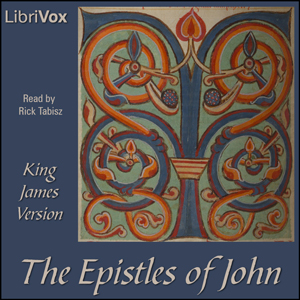
The Authorized King James Version is an English translation by the Church of England of the Christian Bible begun in 1604 and completed in 1611. First printed by the King's Printer, Robert Barker, this was the third such official translation into English; the first having been the Great Bible commissioned by the Church of England in the reign of King Henry VIII, and the second having been the Bishop's Bible of 1568. In January 1604, King James I of England convened the Hampton Court Conference where a new English version was conceived in response to the perceived problems of the earlier translations as detected by the Puritans, a faction within the Church of England.
James gave the translators instructions intended to guarantee that the new version would conform to the ecclesiology and reflect the episcopal structure of the Church of England and its beliefs about an ordained clergy. The translation was by 47 scholars, all of whom were members of the Church of England. In common with most other translations of the period, the New Testament was translated from Greek, the Old Testament was translated from Hebrew text, while the Apocrypha were translated from the Greek and Latin. (Introduction from Wikipedia)
7 episodes
"Psalms is a book of the Hebrew Bible included in the collected works known as the Writings. Psalms were written by various writers, including Israel's King David. The Book of Psalms is divided into five books: Book 1 -- Psa. 1-41; Book 2 -- Psa. 42-72; Book 3 -- Psa. 73-89; Book 4 -- Psa. 90-106; and Book 5 -- Psa. 107-150. The collection includes the following types of psalm, among others: Psalms for praise, guidance, consolation, recognition of God's creation, the need for repentance. Certain Psalms, such as Psa. 22 and Psa. 110 are accepted by Christians and certain Jews as messianic or containing messianic prophecies." (From Wikipedia, modified by Sam Stinson)
13 episodes
"Genesis (Greek: "birth", "origin") is the first book of the Hebrew Bible, and the first of five books of the Pentateuch or Torah. It recounts the world from creation to the descent of the children of Israel into Egypt, and contains some of the best-known accounts of the Old Testament, including Adam and Eve, Cain and Abel, Noah's Ark, the Tower of Babel, and the biblical Patriarchs." (From Wikipedia, modified by Sam Stinson)
7 episodes
"Ecclesiastes is a wisdom book of the Old Testament. The author represents himself as the son of David, and king over Israel in Jerusalem. The work consists of personal or autobiographic matter, at times expressed in aphorisms and maxims illuminated in terse paragraphs with reflections on the meaning of life and the best way of life. The work emphatically proclaims all the actions of man to be inherently "vain", "futile", "empty", or "meaningless," depending on translation, as the lives of both wise and foolish men end in death. While the teacher clearly promotes wisdom as a means for a well-lived earthly life, he is unable to ascribe eternal meaning to it. In light of this perceived senselessness, the preacher suggests that one should enjoy the simple pleasures of daily life, such as eating, drinking, and taking enjoyment in one's wife and work, which are gifts from the hand of God." (From Wikipedia, modified by Sam Stinson)
3 episodes

Hosea was the son of Beeri and a prophet in Israel in the 8th century BCE. He is one of the Twelve Prophets of the Jewish Hebrew Bible, also known as the Minor Prophets of the Christian Old Testament. We know practically nothing about the life or social status of Hosea. According to the Book of Hosea, he married the prostitute Gomer, the daughter of Diblatayim, at God's command. He lived in the Northern Kingdom in the period 740–725 BCE. In Hosea 5:8 ff., there is a reference to the wars which led to the capture of the kingdom by the Assyrians (ca. 734–732 BCE). It is not certain if he has also experienced the destruction of Samaria, which is foreseen in Hosea 14:1. Hosea's family life reflected the "adulterous" relationship which Israel had built with polytheistic gods. His children's names made them like walking prophecies of the fall of the ruling dynasty and the severed covenant with God — much like the prophet Isaiah a generation later. Hosea is often seen as a "prophet of doom", but underneath his message of destruction is a promise of restoration." (From Wikipedia)
3 episodes
"The Book of Joel is part of the Jewish Tanakh, and also the Old Testament of the Christian Bible. Joel is part of a group of twelve prophetic books known as the Minor Prophets or simply as The Twelve; the distinction 'minor' indicates the short length of the text in relation to the larger prophetic texts by the "Major Prophets" known as the Nevi'im." (Summary by Wikipedia)
1 episodes
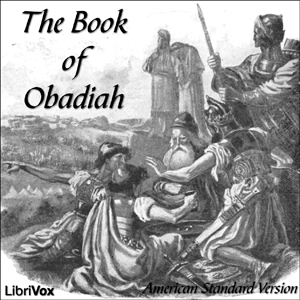
"The Book of Obadiah is found in both the Hebrew Bible and the Old Testament of the Christian Bible, where it is the shortest book, only one chapter long. Its authorship is generally attributed to a person named Obadiah, which means “servant (or worshipper) of the Lord”. Obadiah is classified as a "minor prophet" in the Christian Bible due to the brevity of the writing (only 21 verses) and the content (prophetic material). An Old Testament prophet was (professedly) not only a person who was given divine insight into future events, but a person whom the Lord used to declare his word. The first nine verses in the book foretell total destruction in the land of Edom at the hand of the Lord. Obadiah writes that this destruction will be so complete that it will be even worse than a thief who comes at night, for not even a thief would destroy everything. The Lord will allow all allies of Edom to turn away and help chase Edom out of its land. What is the reason for such a harsh punishment? Verses ten through fourteen explain that when Israel (the Lord’s chosen people) was attacked, Edom refused to help them, thus acting like an enemy. What is even worse is that Edom and Israel share a common blood line through their founders who were brothers, Jacob and Esau. Because of this gross neglect of a relative, Edom will be covered with shame and destroyed forever. The final verses, fifteen through twenty-one, depict the restoration of Israel and the wiping out of the Edomites. Verse eighteen says that there will be no survivors from the house of Esau once the destruction is complete. Israel will become a holy place and its people will return from exile and inhabit the land once inhabited by the Edomites. The final verse of the prophecy places the Lord as King who will rule over all the mountains of Edom." (Summary from Wikipedia)
1 episodes
"The Book of Amos is one of the books of the Nevi'im (Hebrew: "prophets") and of the Christian Old Testament. Amos is one of the minor prophets. Amos was the first biblical prophet whose words were recorded in a book, an older contemporary of Hoseah and Isaiah. He was active c 750 BC during the reign of Jeroboam II. He lived and prophesied in the southern kingdom of Judah. His major themes of social justice, God's omnipotence, and divine judgment became staples of prophecy." (Summary by Wikipedia)
1 episodes
The Books of Samuel (Hebrew: Sefer Sh'muel ספר שמואל) are part of the Tanakh (part of Judaism's Hebrew Bible) and also of the Christian Old Testament. The work was originally written in Hebrew, and the Book(s) of Samuel originally formed a single text, as they are often considered today in Hebrew bibles. Together with what is now referred to as the Book(s) of Kings, the translators who created the Greek Septuagint divided the text into four books, which they named the Books of the Kingdoms. In the Latin Vulgate version, these then became the Books of the Kings, thus 1 and 2 Samuel were referred to as 1 and 2 Kings, with 3 and 4 Kings being what are called 1 and 2 Kings by the King James Bible and its successors. (Summary by Wikipedia)
6 episodes








